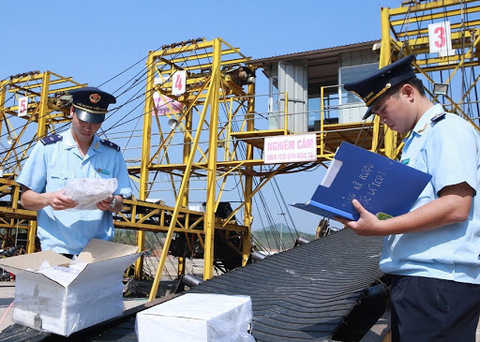
Officials of Mong Cai Customs Department, Quang Ninh Province checks products. Reforms of checks on imported products would help improve the business climate and reduce time and cost. — Photo baoquangninh.com.vn
Reforms of checks on imported products would help improve the business climate while reducing time and costs, which would give significant room for growth, Minister and Chairman of the Government Office Mai Tien Dung has said.
Dung was speaking at the Government Office’s meeting on Tuesday to discuss the draft project about reforms of quality and food safety control on imported products following the proposal of the Ministry of Finance.
Dung said there were barriers in procedures for importing products, which was time-consuming and pushing up costs, adding that the project aimed to tackle these problems and create a favourable business environment.
The World Bank’s Doing Business 2020 report announced in October last year revealed Viet Nam's ranking for the ease of trading across borders dropped four spots from 100th to 104th out of 190 economies while the ease of doing business fell one spot from 69th to 70th.
Detailed measures must be raised to improve ease of trading across borders as well as the business climate and national competitiveness, especially in the context that the Vietnamese Government set the targets of simplifying and cutting at least 20 per cent of business regulations and slashing at least 20 per cent of compliance costs, Dung said.
“If we do well with reforms on checks on imported products, it will create large room for growth," Dung said.
Deputy Minister of Finance Vu Thi Mai said reforms were being carried out but more drastic measures were needed to create breakthroughs.
Specialised checks on imports remained a burden on business, which increased time spent on customs clearance and undermined national competitiveness in trading across borders, she said.
Mai said the project would aim to cut time and costs and create favourable conditions for business, protect the rights of businesses and consumers and improve efficiency in the management of imported products.
The project would focus on reforms which would make customs the focal point for quality and food safety control on imported products.
The finance ministry estimated the reformed model would help reduce the number of declarations for quality and food safety control per year by about 54.4 per cent and help save 2.4 million working days, equivalent to VND881 billion (US$37.8 million).
A representative from the Ministry of Industry and Trade said the project needed to clarify the roles of other ministries in carrying out specialised checks and post-clearance checks to have the most appropriate reforms.
Ngo Hai Phan, Director of the Government Office’s Administrative Procedures Control Agency, said the project would put enterprises at the centre to create the best possible conditions for their operation, reduce time and costs while improving transparency and efficiency in management.
Dung also asked ministries to hasten reforms to remove inconsistencies and overlaps which were burdening businesses.
During the past four years, 3,893 out of 6,191 business prerequisites were removed or simplified, together with removing 6,776 out of 9,926 product lines subjected to specialised checks for customs clearance. This helped save more than 18 million working days, equivalent to more than VND6.3 trillion. — VNS